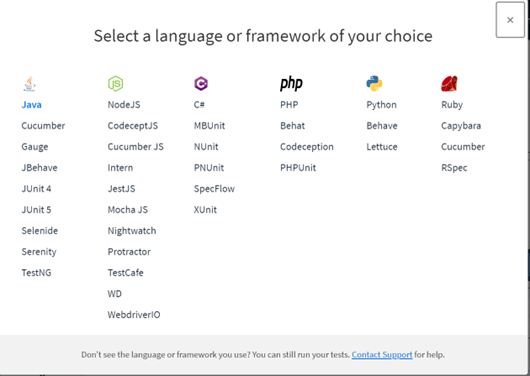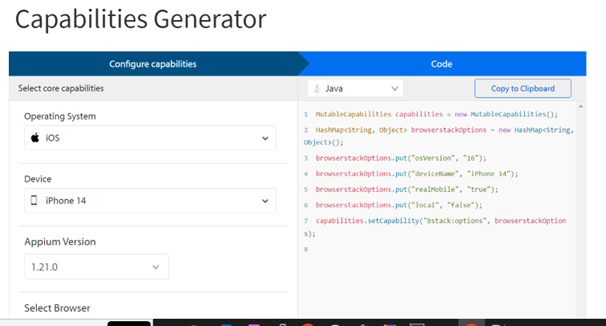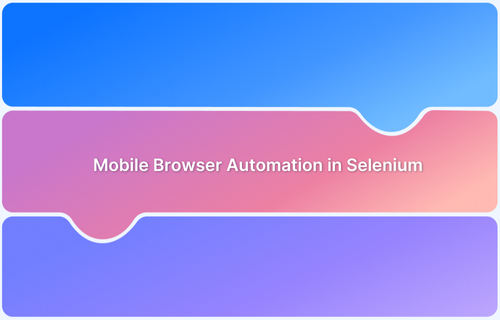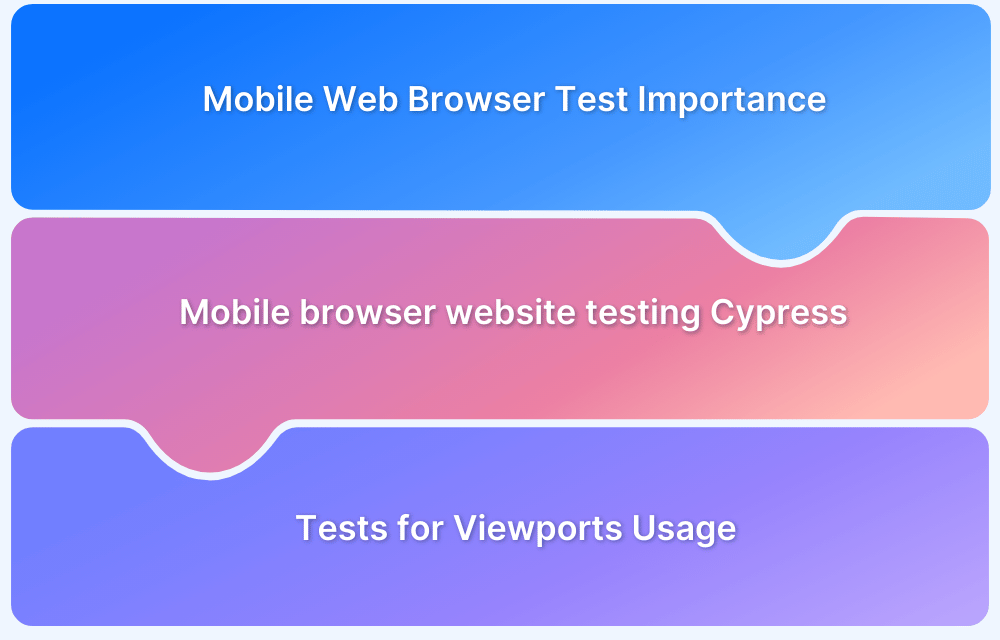All about Mobile Browser Automation
By The Nerdy Geek, Community Contributor - October 30, 2022
Today, retaining a user on any website is not easy. If the font is too small, making it difficult to access, or the website loads slowly, or the webpage freezes, the user will take no longer than 2 seconds to skip your website. Hence, Mobile Browser Testing plays a crucial role in any website’s performance. It ensures that the below features are consistent across different devices and browsers:
- Functionality
- Accessibility
- Security
- Usability
- Performance
- Loading time
- User experience
These Mobile Browser Tests can be automated by leveraging different kinds of mobile automation testing tools and executed across different cross browser combinations. These automated tests over different product releases will ensure that the website is performing consistently across different browsers and devices and has no major issues that are lying undiscovered.
- What is Mobile Browser Automation Testing?
- Why is Mobile Browser Automation important?
- Benefits of Mobile Browser Automation
- How to perform Automated Mobile Browser Testing?
- Why Automated Tests Across Real Devices are a smarter choice?
- Automated Mobile Browser Tests using Real Device Lab on the Cloud – BrowserStack
- Conclusion
What is Mobile Browser Automation Testing?
Mobile browser automation testing refers to the process of testing websites using different mobile automation testing tools. This helps businesses ensure that their product is bug-free before it is released to the market. Benefits of Automated tests include that it help save time and resources, increasing the ROI as a whole.
Why is Mobile Browser Automation important?
Before diving deeper into how Mobile Browser Automation can be achieved, it is important for you to understand why is mobile browser testing important in the first place. It is because mobiles have become more important (almost inseparable), and a lot of users access websites through their mobile devices, especially when on the go.
There are two major reasons behind people keeping mobile browsers installed on their phones even after facing storage issues.
- Firstly, mobiles are super convenient and portable, improving accessibility to the web. Nowadays, nobody wants to wait to get in front of a system first to read an article. Instead, they will simply read it on their mobile browsers.
- The second reason being not all business organizations today have a mobile app developed and a lot of them do not really need one. They can cater to their users simply through the web browsers and do not bother to spend money and time over the development of heavy mobile applications.
Now, this ease of use of mobiles and their humongous reach to each and every hands out there, makes it tough for the developers and testers to ensure that their end users are getting consistent behviour across different mobile devices and browsers. They need to ensure that their applications are indeed cross browser compatible.
Now imagine covering the cross browser tests for one release. That seems achievable, but what if these tests need to be repeated over and over again across different releases and across different browser versions. That can be quite repetitive and at some point of time, it can prove to very expensive in terms of both time and money. This is where Mobile Browser Automation comes into picture and can save a lot of time as well as ensures consistent behaviour for end users.
Benefits of Mobile Browser Automation
Now that we know why is Mobile Browser Automation important, let us take a look at the characteristics that businesses can achieve using Mobile Browser Automation.
- Functionality: Automation testing will help in ensuring that the website’s functionality work seamlessly across all different mobile browsers and their versions.
- Performance: The automation tests can also help in determining if the application is able to withstand high user traffic under peak seasons, and can also determine if there is a fluctuation in response times.
- Security: Automating security tests ensures that the website is safe from malwares of any kind over different releases of different browsers, whic can become a very cumbersome process to test manually.
- Usability: Test automation will also help in maintaining the customer-friendly and ease-of-use aspects of the application across different products or browser version releases.
- Accessibility: Automated tests ensures that the websites are accessible to differently-abled populations and ensure everyone’s easy access.
You might be wondering if the above characteristics can even be achieved via manual mobile browser tests, but considering the size of the mobile users market today, we can never cope up unless we switch to mobile browser automated tests, and not just that, the benefits of these tests can only be reaped quicker and better once we switch to automated tests.
How to perform Automated Mobile Browser Testing?
Automated mobile browser tests involve the below four steps:
- Identifying the tests to be covered
- Automating the selected tests
- Executing the tests on the supported browsers across different mobile devices
- Analyzing the reports of these tests and reporting issues, if needed.
The above steps can be achieved in multiple ways.
For automation, one needs an automation testing tool. For that, we can choose any open source automation testing tools. Selenium is an open-source project that provides a range of tools and libraries in order to support browser automation and is one of the most widely used tools today. It supports a lot of scripting languages like PHP, Java, Ruby, C++, JS, etc. It can easily be integrated with popular frameworks like Maven, TestNG, etc.
Read More: Mobile Browser Automation using Selenium
Next, the execution of these mobile browser tests can also be performed in multiple ways – for example, via emulators, simulators, or real devices. However, automating tests across real devices is always beneficial and effective. It is important to evaluate Mobile Device Emulator for Website Testing vs Real Devices for better accuracy and ROI of the project.
Apart from Selenium, other test automation frameworks such as Cypress, also help perform automation testing on mobile browsers. Cypress is popular for its features that make testing hasslefree.
Why Automated Tests Across Real Devices are a smarter choice?
Real device testing and automation always has an edge over emulators because it to test manually and automated on actual mobile devices. It helps QAs test under real user conditions that are similar to those on which the website will be actually viewed and used by real users.
Testing on Real Devices always ensure accurate results and are effective. In fact, running mobile website tests on real devices has been the most effective way over the years. This enables developers and testers to evaluate how a website behaves in different mobile browsers installed on actual iOS or Android smartphones. However, it brings a question of deciding whether to build vs buy the real device infrastructure.
Maintaining a large variety of devices is not a cakewalk as it requires a lot of investment and effort in procuring and maintaining them. Buying a subscription to a real device cloud like BrowserStack enables developers and testers to test their websites and mobile applications across 3000+ real browsers, operating systems, and mobile devices.
BrowserStack’s real device cloud provides QA teams with the ideal testing infrastructure for comprehensive mobile web testing.
Source: Shopify
Automated Mobile Browser Tests using Real Device Lab on the Cloud – BrowserStack
With BrowserStack Automate, you can easily integrate your existing code and run it across any mobile device. Whether it is Java, C#, Node or JavaScript, the framework integration is smooth enough.
In fact, to test on a real mobile device, you just need to pass the below capability in your test scripts.
‘realMobile’: True
You can easily generate the capabilities using BrowserStack capability generator as seen below.
And as a result, with any framework and language being used, you can easily integrate the tests using BrowserStack and run across different real mobile devices and browser combination.
Conclusion
Now, that we know why Mobile Automation Testing is so crucial, it is important to understand that Mobile serves as the primary means of enabling a lot of businesses today. Still, only those websites that are loads qucikly, enjoy a better footfall and are able to survive the competition. Hence it is essential to increase the website speed and check if it renders and functions properly on mobile devices.
To achieve this, organizations must switch to Mobile Browser Automation testing. Automation replacing the repetitive tasks will prove to be less expensive and overall faster than manual testing, plus one can enjoy the great coverage over both legacy browser versions as well as newly introduced versions. Using tools like BrowserStack Automate you can access 3000+ real device browser combinations to test thoroughly. Also, BrowserStack’s Cloud Selenium Grid allows you to run parallel tests for faster and efficient automation testing.
Run Mobile Automation Tests on BrowserStack for Free
It is also important to understand that while manual testing still continues to be essential, when combined with automation it can prove to be a life changing decision for any organization!






